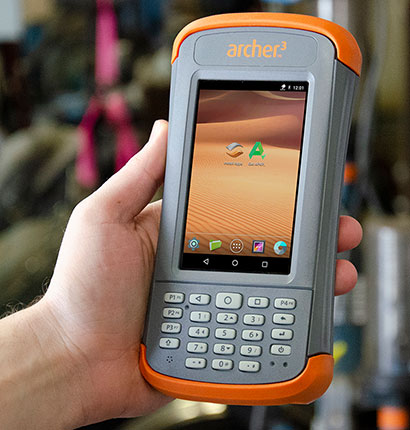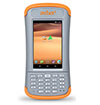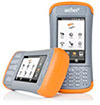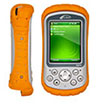|
Juniper Archer 3 Rugged Handheld
Juniper's ultra-rugged handheld switches to Android and gets a number of tech upgrades in the process
(by Conrad H. Blickenstorfer)
On April 5, 2019, Juniper Systems of Logan, Utah, introduced the Archer 3 rugged handheld computer as a follow-up (and eventual replacement) of the company's versatile and virtually indestructible Archer 2. Six years after the release of the Archer 2 Rugged Handheld, the Archer 3 quadruples RAM to 2GB, doubles flash storage to 16GB, has a more powerful battery, and a faster 1.2GHz Cortex A9 processor. The big thing, however, is that the Archer is now on Android.

Other than switching to Android, the Archer didn't need change. Unlike a lot of gear out there that benefits from redesign or replacement, the Archer was right just the way it was. For many customers it was and is the perfect data collection tool. Tough, rugged, reliable.
However, the operating system software that Archers always ran on — first Microsoft Windows Mobile and then Windows Embedded Handheld — is going away and there is no replacement from Microsoft. As a result, the industry is migrating to Android, the immensely popular operating system that the vast majority of all smartphones run on.
"Pocket-sized data collection just got an upgrade," said Jeff Delatore, the Archer product manager at Juniper Systems. "It's the same beloved Archer — but faster, more capable, and running on an accessible operating system most people have on their phone."
Below are the Cliffs Notes of what stays the same and what is new in the Archer 3:
|
Juniper Systems Archer generations
|
|
Model
|
Archer 3
|
Archer 2
|
Archer
|
|
|

|

|

|
|
Introduced
|
2019
|
2013
|
2006
|
|
OS
|
Android 7.1 ASOP
|
WEH 6.5.3
|
Mobile Classic 6.1
|
|
Processor
|
Freescale i.MX6
|
Freescale i.MX53
|
Marvell PXA270
|
|
Clock speed
|
1.2GHz
|
1.2GHz
|
520MHz
|
|
RAM/ROM
|
2GB/16GB
|
512MB/8GB
|
128MB/512MB
|
|
Expansion slots
|
micro SD/SDXC
|
micro SD/SDHC
|
CF Card, SD Card
|
|
Display type
|
TFT
|
TFT
|
Transflective
|
|
Display
|
4.3"/480 x 800 pixel
|
4.3"/480 x 800 pixel
|
3.5"/240 x 320 pixel
|
|
Digitizer
|
Projected capacitive
|
Projected capacitive
|
Resistive
|
|
Battery
|
43.2 watt-hour Li-Ion
|
38.7 watt-hour Li-Ion
|
14.4 watt-hour NiMH
|
|
Battery Life
|
up to 20 hrs.
|
up to 20 hrs.
|
up to 20 hrs.
|
|
Keypad
|
23-key
|
23-key
|
7-key
|
|
Size (inches)
|
3.6 x 7.25 x 1.5
|
3.6 x 7.25 x 1.5
|
3.5 x 6.5 x 1.7
|
|
Weight (oz.)
|
21
|
21
|
17
|
|
Sealing
|
IP68
|
IP68
|
IP67
|
|
Temp. range
|
-22° to 140°
|
-22° to 140°
|
-22° to 130°
|
|
Camera
|
5mp rear (opt.)
|
5mp rear (opt.)
|
not available
|
|
USB
|
Full-size + micro
|
Full-size + micro
|
Mini-USB
|
|
Bluetooth
|
4.2 Class 1.5 (100 ft)
|
2.1 Class 1.5 (100 ft)
|
2.0 Class 1 (65 ft)
|
|
WiFi
|
802.11b/g/n
|
802.11b/g/n
|
required card
|
|
WWAN
|
NA
|
3.75G, HSPA+/UMTS
|
not available
|
|
Scanning
|
Integrated (BC)
|
Integrated (BC)
|
via extended cap
|
And here's some commentary on what's changed and why it matters:
- The move to Android — Would it have been nice if Microsoft hadn't given up on its mobile operating systems that powered most handhelds for so many years? Yes, that would have made things a lot easier for business where Microsoft remains dominant on the desktop and corporate IT infrastructure. On the plus side, due to Android's 80+ percent marketshare in mobile devices, almost everyone is already familiar with Android, and there is abundant Android programming and migration support.
- What is Android 7.1 AOSP? — Android version 7, codenamed "Nougat," is recent enough to be around and supported for a long time. AOSP stands for "Android Open Source Project." It is standard Android and is led by Google itself, but the AOSP version does not come with social media-oriented Google apps such as Chrome, YouTube, GMail, Maps, Photos or the Play Store. Those are not necessary in a data collection tool such as the Archer and would only clutter up the device.
- Faster processor — The Archer 3 has a new and faster ARM-based processor in the 1.2GHz i.MX6. It's made by Freescale Semiconductor that was spun off from Motorola and is now part of NXP. Juniper used an earlier i.MX processor in the Archer 2, probably because even at the Archer 2's launch the handwriting was already on the wall and Juniper wanted to be ready for a migration to Android.
- More memory — Compared to the Archer 2, mass storage has doubled in the Archer 3, and RAM quadrupled. And, as before, storage can be expanded via micro SD card, now supporting the newer SDXC card standard.
- More powerful battery — The Archer 2 had a big battery, and the one in the new model is more powerful yet, with capacity up by 12%. Estimated battery life on a charge remains at 20 hours.
- Updated wireless — Connectivity has been upgraded. Bluetooth went from version 2.1 to "Smart Ready" version 4.2. However, while mobile broadband was available in the Archer 2, it does not appear in the Archer 3's specs.
- Expanded satellite support — Archer 3 GEO models still include a uBlox M8 positioning module, but it now supports the European Galileo and the Chinese BeiDou satellite navigation systems as well. Being able to use more satellite makes for quicker and more accurate positioning.
- The only external design changes we can detect are the now orange Archer logo and small adaptations on the keypad labeling, mostly due to the switch from Windows Embedded Handheld to Android.
The new Archer remains an exceptionally well made and exceptionally functional field computing device. In an era where handhelds and smartphones often just contain a proprietary port or a micro-USB port, the new Archer still has a standard DB9 RS232 serial port, a full-size standard USB port, and a full-size 3.5mm audio jack. What's more, the I/O module is configurable, customizable, and also user-replaceable.
What also hasn't changed is the light-gray/orange color scheme that many have come to associate with Juniper rugged field computing hardware. Note, however, that gray trim available as well.
The new Archer 3
Designing mobile computing technology for the field is a lot more difficult than it used to be. The smartphone and tablet revolution of recent years has forever changed consumer expectations. Meeting those expectations while still providing the basic nuts and bolts of what's needed in the field—ruggedness, legacy support, leverage, compatibility, etc.—is a challenge where erring on one side or the other can make quite a difference.
On their website, Juniper Systems tags their new Archer 3 as "Designed to Work. Built to Last." Juniper Systems devices are always that, and now that Microsoft is no longer in the handheld OS market, Juniper is switching to Android on all of their handhelds. That makes perfect sense. It's field-tested, time-trusted quality and functionality, and now with the new industry standard operating system and software. -- Conrad Blickenstorfer, April 2019
|
|
 Specifications Juniper Archer 3 Specifications Juniper Archer 3
|
|
Status
|
Added 4/2019
|
|
Form-factor
|
Ultra-Rugged Handheld
|
CPU
|
1.2GHz NXP Freescale i.MX6 ARM Cortex A9
|
OS
|
Android 7.1 AOSP
|
RAM/ROM
|
2GB RAM/16GMB Flash |
Card slots
|
1 micro SD/SDXC
|
Display type
|
High visibility backlit color TFT, optically bonded
|
Display size/res
|
4.3"/800 x 480 pixel WVGA
|
Digitizer/pens
|
Projected capacitive touch, optically bonded, scratch-resistant
|
Keyboard/keys
|
23-key numeric keypad (6 user-assignable) with adjustable backlight
|
Navigation
|
Touch
|
Housing
|
Hardened plastic, impact-absorbing bumpers
|
Operating Temp
|
-22° to 140°F (-30°; to 60°C)
|
Sealing
|
IP68 (1.4 meters for 30 minutes)
|
Shock
|
MIL-STD 810G 516.6 -- Multiple 5-foot drops to concrete
|
Vibration
|
MIL-STD 810G 516.6
|
Altitude
|
MIL-STD 810G 500.5
|
Humidity
|
MIL-STD 810G 507.5
|
Size (WxHxD)
|
3.6 x 7.25 x 1.5 inches (91 x 184 x 38 mm)
|
Weight
|
20.8 oz (590 g)
|
Power
|
3.6V 12,000mAH 43.2 watt-hour ("up to 20 hrs")
|
Camera
|
Optional 5mp AF with LED illuminator
|
GPS
|
72-channel GPS/GLONASS/SBAS w/ 2.5 meter accuracy (GEO and HAZLOC models only)
|
Scanner
|
1D/2D barcode imager/decoder (BC models only)
|
Interface
|
1 x USB host, 1 x Micro B, 1 x RS232 DB9, 3.5mm audio jack (I/O module customizable)
|
Wireless
|
Options: Class 1.5 Bluetooth 4.2, WiFi 802.11b/g/n
|
Certifications
|
FCC Class B, CE, Industry Canada, EN60950 Safety; optional Class I, II, III Division 2 for hazardous locations
|
List price
|
Inquire
|
Contact
|
www.junipersys.com
|
Web page
|
Archer 3 web page
|
Specs
|
 Archer 3 spec sheet Archer 3 spec sheet
|
|
 Juniper Archer3 Juniper Archer3
|

|
|






